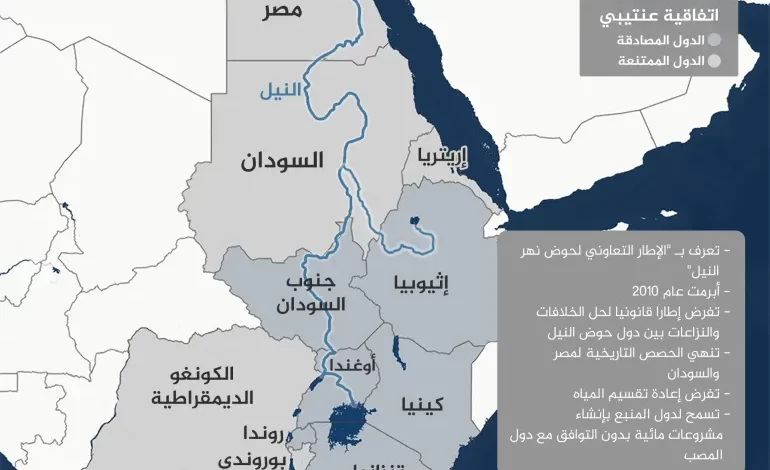The Entebbe Agreement: Unveiling Sudan and Egypt’s Opposition

Sudan Events – Agencies
Once again, the crisis surrounding the Cooperative Framework Agreement for the Nile Basin (Entebbe) has resurfaced with its entry into force as of last Sunday. The strong opposition of Egypt and Sudan to joining the treaty casts a heavy shadow over its ambiguous fate.
The agreement has been ratified by five countries: Ethiopia, Tanzania, Uganda, Rwanda, and Kenya. South Sudan became the sixth signatory on July 8th, completing two-thirds of the basin countries and paving the way for the implementation of the agreement. Meanwhile, Congo, Egypt, Sudan, Burundi, and Eritrea have remained distant.
Article 43 of the agreement stipulates that it will come into effect 60 days after the ratification document is deposited with the African Union.
1. How did the agreement come about?
The Entebbe Agreement was negotiated under the auspices of the Nile Basin Initiative and was adopted by the Basin Ministers on May 22, 2009. It is inspired by the United Nations Convention on the Law of Non-Navigational Uses of International Watercourses. South Sudan joined in July last year, a step that paved the way for the agreement to come into force and established the Nile Basin Commission.
2. What does submitting the agreement to the African Union mean?
On September 9th, Ethiopia officially submitted the Entebbe Agreement to the African Union, paving the way for its implementation and the establishment of the Nile Basin Commission. This step was revealed in a letter to the UN Security Council from Ethiopian Foreign Minister, Demeke Mekonnen, stating: “Ethiopia wishes to inform the Council members of the deposit of the agreement with the Commission of the Union, facilitating its entry into force and the creation of the commission to coordinate the implementation of the comprehensive framework agreement.” He considered the agreement the first legal framework at the basin level that could enhance cooperation between riparian countries for the shared prosperity of the basin’s peoples.
3. Why do Sudan and Egypt oppose it?
International law expert Faisal Abdel Rahman Ali Taha explains the reasons for the disagreement, stating that the agreement was not accepted by the two downstream countries (Egypt and Sudan) due to their reservations about Article 14(b), which concerns water security.
Speaking to Al Jazeera, he explained that Egypt had proposed an alternative wording for the article, stipulating that there should be no adverse impact on the food security, water uses, or other rights of any of the Nile Basin countries.
He added, “The disputed article aimed to affirm the legal importance of the water security principle, but it sparked a disagreement that brought everyone back to square one.”
According to the legal expert, the dispute revolves around the legal status of the 1929 and 1959 agreements and the quotas granted to Egypt and Sudan under them.
4. What efforts have been made to bridge the gap between the Nile Basin countries?
Over the years, numerous meetings were held to reach a consensus on this article, but according to Abdel Rahman, no progress was made. The extraordinary meeting of the Council of Ministers held in Kinshasa on May 22, 2009, decided to append it to the agreement, to be addressed by the Nile Basin Commission within six months of its establishment. He adds, “Indeed, the article appears as an appendix to the agreement.”
He does not rule out that the dispute over Article 14(b) may remain unresolved, and the agreement could proceed without Sudan and Egypt. He adds, “If they remain outside the agreement, the goal of establishing a cooperative and institutional framework to manage the Nile Basin based on principles acceptable to all basin countries will not be achieved, as Egypt and Sudan are the most in need of the Nile waters and the most reliant on them.”
5. What is Ethiopia’s stance on the agreement?
Ethiopia supports the Entebbe Agreement, a position that aligns with its ongoing dispute with Sudan and Egypt over the Grand Ethiopian Renaissance Dam, which both countries oppose. For years, Khartoum and Cairo have demanded a legally binding tripartite agreement on the filling and operation of the dam, especially during drought periods, to ensure the continued flow of their Nile water quotas.
Tensions between Ethiopia and Egypt are particularly evident over the dam, with Addis Ababa accusing Cairo of building multiple projects on the Nile without conducting impact assessments, while completely disregarding the rights of other riparian countries.
In contrast, Cairo accuses Addis Ababa of pursuing unilateral policies that violate the rules and principles of international law. Sudan, meanwhile, insists on prior coordination before filling and opening the dam’s gates to prevent damage to its lands, as the dam is located just a few kilometers from the Roseires Reservoir in Sudan’s Blue Nile region bordering Ethiopia.
Commenting on the Entebbe Agreement coming into effect, Ethiopian Prime Minister Abiy Ahmed tweeted on Sunday, “October 13, 2024, marks the culmination of a long journey toward the fair and reasonable use of Nile waters. This day will be remembered as a historic milestone in our collective efforts to enhance real cooperation in the Nile Basin.” He called on non-signatory states to join the “Nile family to achieve our shared goals of development and regional integration together.”
6. What are Sudan and Egypt’s chances in dealing with the new Entebbe reality and the possibility of adjusting their quotas?
Both Egypt and Sudan fear that upstream countries might undertake projects that consume large amounts of water, affecting their historical quotas. The Entebbe Agreement closes the door to any possible negotiations regarding these quotas, which is why the two countries renewed their opposition to the treaty following meetings held by the Permanent Joint Technical Commission for Nile Waters on October 11 and 12.
In a statement after the meeting, the two countries reaffirmed that the Entebbe Agreement is not binding on them and that the commission of the six countries emerging from the incomplete framework agreement does not represent the Nile Basin in any way. They called on the basin countries to reunite and refrain from unilateral actions that contribute to division between upstream and downstream countries.
In an interview with Al Jazeera, Sudanese legal expert and lawyer Hatem Al-Sanhouri believes that the issue with the 1959 agreement, which grants Egypt around 55 billion cubic meters of water and Sudan 18.5 billion cubic meters, was what angered both countries. He described the quotas as “unjust.”
According to Al-Sanhouri, insisting on historical rights goes against international law and the agreements promoting the fair use of resources among sovereign states.
7. Can Egypt and Sudan be compelled to join the agreement despite their refusal?
Legal expert Al-Sanhouri believes the current conflict has a legal dimension regarding state sovereignty over its resources, including the delineation of Nile borders. He argues that Egypt and Sudan now face the Nile Basin Commission, which—after South Sudan’s signing—represents the relevant party responsible for reviewing agreements and encouraging other countries to join.



